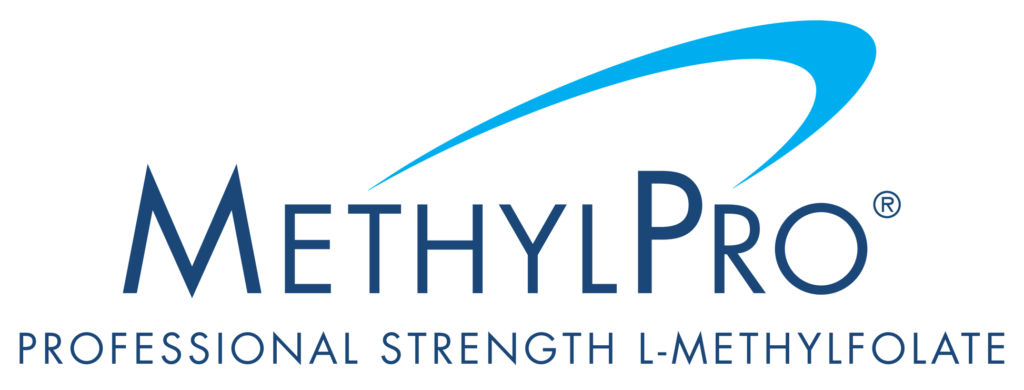In recent years, the terms “methylation” and “methylated vitamins” have gained attention among health-conscious individuals, especially those seeking support for mood and mental wellness.
But what exactly are methylated vitamins, and why are they essential for optimal brain function? Let’s explore the science of methylation and how methylated vitamins play a pivotal role in mental wellbeing.
What Is Methylation?
Methylation is a fundamental biochemical process that occurs in every cell of the body. It involves transferring a methyl group (one carbon atom and three hydrogen atoms) to other molecules, such as DNA, proteins, and neurotransmitters. This transfer helps regulate gene expression, repair DNA, detoxify the body, and produce critical brain chemicals like serotonin, dopamine, and norepinephrine [1].
When methylation functions efficiently, it supports balanced mood, emotional regulation, and cognitive clarity [2-4]. However, impaired methylation can disrupt these systems, leading to a wide range of mental health symptoms [4].
A Historical Look: Methylation and Mental Health
Scientists first began to understand the importance of methylation in the mid-20th century when studying gene expression. But, it wasn’t until the 1990s and early 2000s that researchers began connecting impaired methylation with mental health issues. These findings helped lay the foundation for new, nutrient-based approaches to mood and mental wellness.
Methylation and Neurotransmitter Signaling
One of the most important roles of methylation is in neurotransmitter synthesis and regulation. Methylation supports:
- Synthesis of neurotransmitters like serotonin and dopamine from amino acid precursors [4].
- Activation of enzymes required to convert these precursors into their active forms [4].
- Breakdown and recycling of neurotransmitters after they’ve done their job [4].
The process also produces SAMe (S-adenosylmethionine), a major methyl donor that is essential for neurotransmitter production and mood regulation [4]. Without sufficient methylation, neurotransmitter balance can become disrupted, potentially resulting in symptoms like irritability, tension, worry, apathy, a low mood, brain fog, and low energy [4].
The Discovery of L-Methylfolate Supplementation
L-methylfolate is the active, methylated form of folate (vitamin B9) that the body uses directly in methylation. It bypasses the conversion steps required by non-methylated folic acid and supports the production of neurotransmitters more efficiently [5].
L-methylfolate supplementation gained traction in the early 2000s when clinical studies showed its ability to enhance response to traditional mood treatments, particularly in people with methylation impairments [6]. Essentially, treatments designed to inhibit the reuptake of serotonin cannot be effective if the body is not making enough serotonin to begin with. Folate can be the limiting factor in proper neurotransmitter sythesis.
Unlike synthetic folic acid, L-methylfolate is immediately usable by the body, making it an ideal choice for those with genetic variations that interfere with folate metabolism [4].
MTHFR Mutations and Methylation Challenges
A major breakthrough in understanding methylation issues came with the discovery of mutations in the MTHFR (methylenetetrahydrofolate reductase) gene. This gene codes for an enzyme that converts folate into its active form, L-methylfolate.
People with MTHFR mutations—particularly the common C677T and A1298C variants—may have reduced enzyme activity, meaning their bodies can’t produce enough L-methylfolate from dietary folate sources [7]. As a result, they may struggle with neurotransmitter synthesis, detoxification, and homocysteine regulation.
Symptoms of Impaired Methylation
When methylation is compromised, individuals may experience a range of mental and physical symptoms, including:
- Extended periods of sadness or apathy [4]
- Worry, tension, and irritability [4]
- Brain fog or cognitive decline [8,9]
- Low energy [10]
- Poor stress tolerance [11]
- Sleep disturbances [12]
How Methylated Vitamins Can Help
Methylated vitamins provide the body with nutrients in their active, bioavailable forms—ready to support methylation without requiring extra conversion steps. These include:
- L-methylfolate (active B9)
- Methylcobalamin (active B12)
- Pyridoxal 5′-Phosphate (P-5-P; active B6)
- Riboflavin 5′-Phosphate (active B2)
By providing these activated nutrients, methylated vitamins can bypass genetic roadblocks and promote optimal methylation, supporting mental clarity, emotional resilience, and overall well-being [4].
MethylPro: Advanced Methylation Support
At MethylPro, we specialize in professional-grade L-methylfolate supplements and other comprehensive methylation support formulas. Whether you know you have an MTHFR mutation or simply want to support your mental health with nutrition, our high-quality methylated vitamins are designed to work with your body, not against it.
Explore our full line of products to find the right blend of L-methylfolate and supportive nutrients for your needs—and start feeling the difference that balanced biochemistry can make.
Methylated vitamins aren’t just a trend—they’re a powerful tool for supporting your brain, mood, and quality of life.
References
- https://link.springer.com/chapter/10.1007/978-981-97-2681-3_2
- https://www.jpn.ca/content/40/5/296.short
- https://link.springer.com/article/10.1186/s12888-018-1740-9
- https://www.mdpi.com/2072-6643/15/17/3859
- https://www.cambridge.org/core/journals/cns-spectrums/article/good-better-best-clinical-scenarios-for-the-use-of-lmethylfolate-in-patients-with-mdd/732A84D8B7A05A6F2B26E23BF4487C57
- https://www.cambridge.org/core/journals/cns-spectrums/article/abs/novel-therapeutics-for-depression-lmethylfolate-as-a-trimonoamine-modulator-and-antidepressantaugmenting-agent/7611467A3E15799B39B217BF0851EC75
- https://onlinelibrary.wiley.com/doi/pdfdirect/10.1007/s10897-016-9956-7?utm_source=chatgpt.com
- https://www.sciencedirect.com/science/article/pii/S2451902216301136
- https://neurolaunch.com/mthfr-brain-fog/
- https://karger.com/jnn/article-abstract/8/3/137/182022/Epigenetics-in-Clinical-Practice-Characterizing
- https://onlinelibrary.wiley.com/doi/full/10.1111/j.1600-0447.2011.01806.x
- https://www.tandfonline.com/doi/abs/10.1080/19390211.2024.2327541

